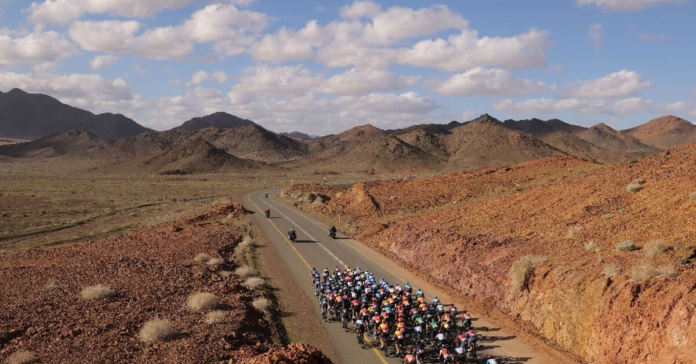February 2, 2023 — Al-Ula (Saudi Arabia) (AFP)
Cycling is the newest gem in Saudi Arabia’s expanding collection of sporting jewels as the conservative Gulf monarchy and its neighbours invest hugely in sport to burnish their international image and diversify their economies.
This week’s Saudi Tour is the first of three stage races in the Arabian Peninsula in February, with competitions also scheduled in Oman and the United Arab Emirates.
Among the riders are Dutch sprinter Dylan Groenewegen, a winner of five stages at the Tour de France, and German veteran John Degenkolb, who has claimed titles at Paris-Roubaix and Milan-San Remo.
The event is unfolding in a vast region of northwestern Saudi Arabia the size of Belgium that is home to UNESCO-listed archaeological sites and canyons — but few spectators.
An ostentatious competition launch last weekend featured a dazzling drone show, while the competitors are feted at every presentation, with podiums erected in the middle of the desert or atop exposed boulders.
The absence of large crowds — only a few dozen fans gathered at the finish line of stage one on Monday — offers riders a more relaxed atmosphere, with some able to sip a coffee shortly before the start.
A demanding course snaking through high-lying plateaus tests the teams’ endurance as the riders contend with fierce winds, a sandstorm and the threat of camels and donkeys crossing the road.
– Growing sports portfolio –
But the real stakes are arguably diplomatic.
The tour in Al-Ula adds to Saudi Arabia and its regional neighbours’ long-term quest to wield soft power through sport and wean economies off the huge revenues generated for decades by fossil fuels exports.
This has included Saudi Arabian club Al Nassr signing football superstar Cristiano Ronaldo and investments in teams such as Newcastle United — potentially the prelude to a successful World Cup bid after Qatar organised last year’s edition.
On Wednesday, Saudi Arabia was selected to host football’s 2027 Asian Cup, adding to a portfolio of major events including the 2029 Asian Winter Games — to be held on artificial snow — and the 2034 Asian Games.
According to media reports, the kingdom has also tried to acquire the ownership of Formula One.
– ‘Cycling capital of Saudi Arabia’ –
Cycling is no exception to the trend. Apart from this month’s races, three of the UCI World Tour’s 18 teams have a Gulf country as a major sponsor.
They include two-time Tour de France champion Tadej Pogacar’s Team UAE, Team Bahrain Victorious and Australia’s Jayco, co-sponsored by AlUla to the tune of $7 million per year.
Phillip Jones, chief destination management and marketing officer at the Royal Commission for AlUla, told AFP the goal was to make the location “the cycling capital of Saudi Arabia if not the Middle East”.
The authorities aim to foster luxury tourism in Al-Ula as part of the multi-billion-dollar “Vision 2030” national development project launched by Saudi Crown Prince Mohammed bin Salman.
One early beneficiary are the Saudi Tour competitors, put up in luxury lodges costing 1,000 euros (around $1,100) per night at the host country’s expense.
The arid and sparsely populated region can offer stays for cyclists during the October-March high season before the searing summer heat, with a commitment to sustainability and respecting the local environment, Jones said.
Organisers Amaury Sport Organisation said they intended to continue developing cycling in the region and are planning to create a women’s Saudi Tour, with the UAE Tour offering one this year.
– Sportswashing? –
The tour has sparked criticism from human rights campaigners concerned about the kingdom’s human rights record, who say it is an example of “sportswashing”.
The astronomical sums of money splurged on the event have also created tensions among the cycling community.
Vincent Lavenu, general manager of French team AG2R-Citroën, said other resources were necessary to satisfy world cycling’s investment needs from sources other than Saudi Arabia or the UAE.
Riders have been more diplomatic.
“We’re part of a system and turning down offers isn’t simple. Riders benefit but I think the region here does too,” Degenkolb told AFP.
Competitors also appreciated the calm and more informal experience of racing in a remote wilderness compared with the intensity of European tours.
“It’s not a holiday but it’s a hell of an experience,” said Austria’s Felix Grossschartner, who thinks having such events one or twice a season would be a great idea.




